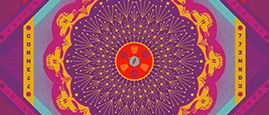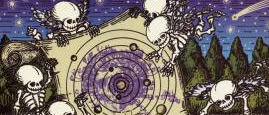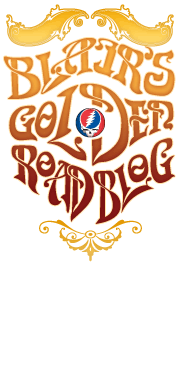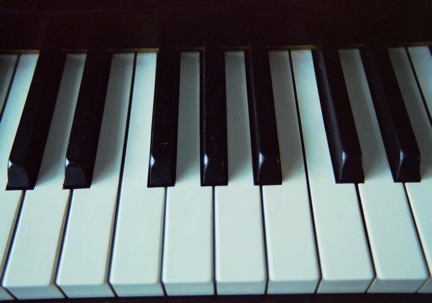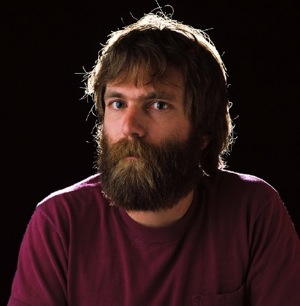This could verge on the sacrilegious, but I’ve been thinking for some time that Jeff Chimenti may be the best all-around keyboardist to have played with the Grateful Dead or the post-GD bands. This guy can play anything: from raucous rock to convincing jazz to delicate melodic whispers. He is a magnificent pianist and a beast on the B-3. He’s assertive without being a hog. If he’s ever played a bad show, I’m not aware of it.
The first few years I saw him with RatDog, he didn’t really register on my radar much for some reason. I could tell he was a good player and all, but he wasn’t leaping out of the mix at me. All that changed in 2004, when he became the sole keyboardist in The Dead (rather than sharing the job with Rob Barraco as he did on their 2003 tour). All of a sudden I was hearing his parts in a new light and was able to understand the depth of his diverse talents. He always seemed to have the right tone and the right part and he fearlessly went out on the edge with Phil, Bob, Warren and company. That, in turn, made me appreciate his role in RatDog more, and I’ve been a Jeff believer ever since. He’s perfect for Furthur because he knows the material inside and out but also brings his own strong musical personality to the party.
“But wait a second, BJ. Better than Keith? Better than Brent?”
I don’t know, man. It’s so hard to compare players and eras. Maybe I’m just being provocative.
I have been asked many times through the years who my favorite Grateful Dead keyboardist was, and I usually answer “Keith Godchaux.” There was something about Keith’s playing that made it feel completely integral to the band’s sound—particularly from ’71 to ’74—in a way that no other GD keyboardist’s work did for me. Maybe it was the timbre of that grand piano and the way it slotted into the gestalt. There was an effortless quality to his playing, whether it was deep space or rollicking barrelhouse or rippin’ rock ’n’ roll that felt perfect to me for that band at that time.
The downside, if you can call it that, is that piano can start to feel monochromatic after a while, and Keith wasn’t adept at providing other keyboard textures. I liked some of his Fender Rhodes work, but it seemed to limit him texturally rather than expanding his palette. Interestingly, he was very good on multiple keyboards in the studio (see Mars Hotel), but couldn’t translate that diverse attack to the stage. His playing in the Dead after 1976 is less interesting, though he continued to thrive for a while in the more intimate chamber music setting the Jerry Garcia Band provided for him. Don’t let his bland onstage disposition fool you. He had serious chops.
The shift to Brent immediately brought bold new colors to the band’s sound (not to mention a fine harmony singer). Brent was the consummate B-3 player, one of the best I’ve heard. I was less taken with his piano tones, however. After Keith’s beefy grand, some of the rinky-tink piano sounds that came from Brent’s arsenal of electronic keyboards were lacking for me. His first year-plus in the band he played some cool synth parts on a few songs, but for some reason he then more or less dropped them.
I never felt that Brent fully embraced the Dead’s spacier side; perhaps it’s because he was not from the hippie world and didn’t have that acid head. Maybe he just didn’t dig it. But his playing got better and more adventurous as the years went along, and I loved his first forays into MIDI—the “fiddle” he’d lay down on a country number, the cool combinations of instruments he’d conjure to decorate a tune. From ’87 through the spring of ’90, he played his best.
Vince had the thankless job of coming into the band so quickly following Brent’s death and being told he wasn’t going to play either a real piano or a B-3. Instead, he was stuck behind a solitary MIDI electronic keyboard loaded with sounds supplied to him by Bob Bralove, some of which were, in his first tours with the group, frankly cheesy. I am not a Vince detractor. On the contrary, I really liked the light, positive vibe he brought to the band, which was such a welcome contrast to Brent’s occasional dark surliness. But he had not been a soloist or much of an improviser in The Tubes or with Todd Rundgren, and the learning curve when he came into the Dead was steep—not just the parts, but the feel and the flow. He definitely had his struggles early on.
Bringing in Bruce Hornsby to share the keyboard duties with Vince was a bold move. Bruce was already a well-established star on his own and one of the strongest pianists working in rock at the time, so his dynamic and forceful musical personality instantly changed the way the Dead sounded—mostly for the better. I liked hearing acoustic piano again, and Jerry, especially, seemed buoyed by his presence. Vince went into the background more and now found himself looking for ways to stay out of the way of Bruce’s bright piano and to add broader flavors to what had become a very thick stew indeed. I do not mean it as any kind of put-down when I say that Bruce always seemed like Bruce to me when he was in the Grateful Dead—slightly apart from the others, never quite subsumed into the greater whole. After all, we knew from the start that he was—to use a term from the sports world—a “rental”; a temporary fix. That said, many of my favorite shows from the early ’90s are ones that featured both Bruce and Vince together. There’s a certain grandness and drama to that sound that I really loved, particularly from the summer of ’91.
After Bruce’s departure, Vince started to come into his own more. It helped that he finally acquired some better organ tones (though they never matched the richness of a real B-3), and he became more confident as time went on. As with Brent, I appreciated the cover tunes he sang with the band more than his original songs, but I always liked his upbeat presence. Unfortunately, his rise in the band coincided with Jerry’s gradual physical decline, so his tenure with the group will always be tainted by that sad truth. Ironically, after Jerry died and Vince formed Missing Man Formation, we got to see what a nifty player he really was.
No, I haven’t forgotten Pigpen and TC.
Pigpen was not a great keyboardist, but he certainly was an important part of the group’s early sound. I like that wheedle-y Vox that dances across their songs in ’66 and ’67, and you’ll find some solid B-3 work from him here and there later on. His contributions, even when they were rudimentary, were always tasteful. And listen closely to the Europe ’72 box and you might be surprised at how much and how well he played on what turned out to be his last tour. I think we can all agree, however, that his vocals and his personality were his greatest contributions to the group.
As for TC, well, he was obviously a highly accomplished player—a virtuoso—when he joined the band, but he was hampered by usually having to play a Vox organ onstage, with its limited range of sounds. I also sense a certain reluctance to break free in his playing, as if he never felt like he had the green light to really take off (in fact, he’s said as much). Still, the fact remains he was with the band for one of its greatest years—1969—and he was a key component in the sound of that group. Would he have been comfortable as the band increasingly turned toward country and more conventional rock ’n’ roll shadings after he left? We’ll never know. But I’ll always have that TC organ from some ’69 “Dark Star” floating through some part of my brain.
In the post Grateful Dead-era we’ve been treated to a wide range of keyboardists, all of whom I’ve enjoyed on one level or another.
OK, I thought Johnnie Johnson was wasted in RatDog for the most part. Yes, he was a legend, but that was not the best use of talents.
Of the handful of players that have occupied the keyboard chair in Phil & Friends through the years, my favorite was Steve Molitz, who played in the last steady incarnation of the group (with Larry Campbell and Jackie Greene). Steve was extremely versatile (like Jeff C.), had tons of energy, and also used synths so creatively. I also liked Rob Barraco’s work both in the Phil Lesh Quintet (with Warren Haynes and Jimmy Herring) and with The Dead. He had lots of good musical ideas, and as a veteran of Dead cover bands, he really understood the material. I also appreciated his always cheery demeanor onstage. I think he’s been underrated by fans.
Billy Payne of Little Feat probably logged the third most shows at keyboards with Phil & Friends. I’ve been a huge fan of his forever and count him among the best keyboardists rock ever produced. However, the couple of times I saw him and his LF bandmate Paul Barrere in the group we affectionately called “Phil & Feat,” I felt that the music wasn’t as free as it needed to be, that it was being reined in somewhat by these great players who were not used to the loose jamming that is such a part of the Grateful Dead (and Phil) tradition. (But I still love Little Feat!)
Then there were a couple of others who moved in and out of the keys slot in Phil’s band for relatively brief stints, including Phish’s Page McConnell and the David Nelson Band’s Mookie Siegel. Both good players, obviously. Neither was there long enough to make a strong impression. Forgive me if I’ve forgotten anyone!
So, that’s my take on keyboards. What do you think?

